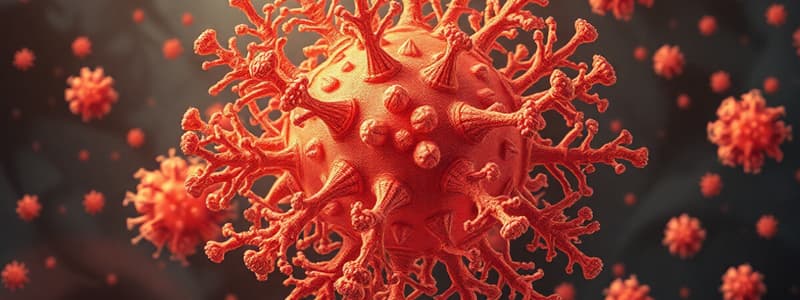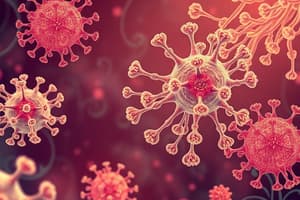Podcast
Questions and Answers
What distinguishes superantigens from T-dependent antigens?
What distinguishes superantigens from T-dependent antigens?
- Superantigens activate specific lymphocytes only.
- Superantigens cannot bind to T cell receptors.
- Superantigens induce a monoclonal response.
- Superantigens activate a large number of lymphocytes non-specifically. (correct)
What is the primary consequence of polyclonal activation by superantigens?
What is the primary consequence of polyclonal activation by superantigens?
- Increased production of monoclonal antibodies.
- Enhanced production of immune suppressive factors.
- Excessive release of pro-inflammatory cytokines. (correct)
- Activation of B cells only.
What defines haptens in the context of immune response?
What defines haptens in the context of immune response?
- They are non-immunogenic but can activate immunity when conjugated to a carrier. (correct)
- They are derived only from viruses.
- They are fully immunogenic substances.
- They can induce an immune response independently.
Which statement is true regarding autoantigens?
Which statement is true regarding autoantigens?
What characterizes exogenous antigens?
What characterizes exogenous antigens?
Which age group typically has a better immune response to the same antigen?
Which age group typically has a better immune response to the same antigen?
What type of antigens engage B lymphocytes without requiring helper T cells?
What type of antigens engage B lymphocytes without requiring helper T cells?
Which of the following antigen types is predominantly formed by proteins?
Which of the following antigen types is predominantly formed by proteins?
What factor can enhance the body's immune response to an antigen?
What factor can enhance the body's immune response to an antigen?
Which of the following statements about nucleic acids as antigens is accurate?
Which of the following statements about nucleic acids as antigens is accurate?
Which antimicrobial route of administration is commonly used for most vaccines?
Which antimicrobial route of administration is commonly used for most vaccines?
Which type of antigen is described as being resistant to degradation and having a polymeric structure?
Which type of antigen is described as being resistant to degradation and having a polymeric structure?
Which of the following is NOT a common route of vaccine administration?
Which of the following is NOT a common route of vaccine administration?
What are the two cardinal features of antigens?
What are the two cardinal features of antigens?
Which type of antigen is capable of stimulating an immune response on its own?
Which type of antigen is capable of stimulating an immune response on its own?
What term refers to the specific part of an antigen responsible for inducing an immune response?
What term refers to the specific part of an antigen responsible for inducing an immune response?
Which factor does NOT affect the immunogenicity of an antigen?
Which factor does NOT affect the immunogenicity of an antigen?
What type of antigens are produced by infectious agents like bacteria and viruses?
What type of antigens are produced by infectious agents like bacteria and viruses?
Which type of antigen requires a carrier molecule to induce an immune response?
Which type of antigen requires a carrier molecule to induce an immune response?
Which molecules are primarily involved in the binding of antigens?
Which molecules are primarily involved in the binding of antigens?
What characteristic of particulate antigens makes them more immunogenic compared to soluble antigens?
What characteristic of particulate antigens makes them more immunogenic compared to soluble antigens?
What happens to antigens that are denatured compared to their native forms?
What happens to antigens that are denatured compared to their native forms?
Which of the following is an example of a non-microbial antigen?
Which of the following is an example of a non-microbial antigen?
Flashcards are hidden until you start studying
Study Notes
Antigens
- Antigens are molecules that trigger an immune response when introduced into the body.
- They bind to antibodies, MHC molecules, or lymphocyte receptors (TCRs and BCRs).
- There are two main types: immunogens and haptens.
Immunogens and Haptens
- Immunogens: Substances that stimulate an immune response on their own.
- Haptens: Substances that cannot induce an immune response by themselves but can do so when combined with a larger molecule, such as a host protein.
Cardinal Features of Antigens
- Immunogenicity: The ability of an antigen to induce an immune response (T cells, B cells, antibodies).
- Antigenicity: The ability of an antigen to bind to the products of the immune response it triggered (lymphocytes or antibodies).
Epitope or Antigenic Determinant
- The specific part of an antigen responsible for inducing the immune response and binding to immune response products (lymphocyte receptors and antibodies).
Sources of Antigens
- Infectious agents (microbial antigens): Bacteria, viruses, parasites, fungi.
- Altered self-antigens: Tumor cells.
Challenges of Parasitic Antigens
- Parasites often have complex life cycles, which can present challenges in developing effective vaccines.
- Example: Malaria parasites have multiple stages in their life cycle, making it difficult to target a single antigen for vaccination.
Non-microbial Antigens
- Cell Surface Antigens:
- Blood group antigens (A, B, AB, O)
- Rh Factor
- MHC class I (found on all nucleated cells)
- MHC class II (primarily found on antigen-presenting cells).
Factors Affecting Immunogenicity
- Foreignness: The immune system primarily recognizes and targets non-self substances.
- Size: Larger antigens tend to be more immunogenic.
- Chemical composition: Complex molecules with diverse antigenic determinants are often more immunogenic.
- Physical properties: Particulate antigens are generally more immunogenic than soluble antigens, and denatured antigens tend to be more immunogenic than native forms.
- Degradability: Easily phagocytosed and degraded antigens are typically highly immunogenic.
- Genetic factors: Variations in antigen receptor genes can influence an individual's immune response against a specific antigen.
- Age: Young and elderly individuals may have a weaker immune response compared to middle-aged individuals.
Chemical Nature of Antigens
- Proteins: The most common and potent antigens.
- Polysaccharides: Can be strong immunogens.
- Nucleic acids: Weak antigens, but can become highly immunogenic when combined with proteins.
- Lipids: Generally not immunogenic, but some can act as haptens.
Routes of Administration (Vaccine Antigens)
- Per os (oral): Polio vaccine
- Intranasal: FluMist
- Intramuscular: Most vaccines
- Intravenous: Rarely used
- Intradermal: BCG for tuberculosis vaccine
- Subcutaneous: Most vaccines
Adjuvants
- Substances that enhance the immune response to an antigen.
Types of Antigens
- T-independent antigens: Directly stimulate B lymphocytes to produce antibodies without the need for helper T cells.
- Examples: Lipopolysaccharides
- T-dependent antigens: Indirectly stimulate B lymphocytes to produce antibodies.
- Helper T cells are required.
- Examples: Proteins
- Superantigens: Activate a large number of T cells non-specifically.
- Primarily derived from bacteria or viruses.
- Can lead to excessive cytokine production and systemic toxicity.
- Haptens: Small, non-immunogenic substances that require conjugation to a carrier molecule to elicit an immune response.
- Autoantigens: Self-antigens that the immune system normally does not recognize. They play a role in autoimmune diseases.
- Exogenous antigens: Enter the body from external sources.
- Endogenous antigens: Generated inside cells, often due to viral or bacterial infection.
Studying That Suits You
Use AI to generate personalized quizzes and flashcards to suit your learning preferences.




